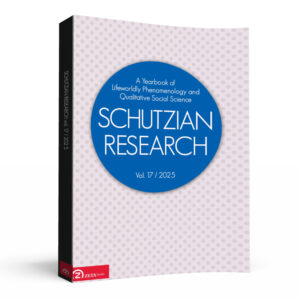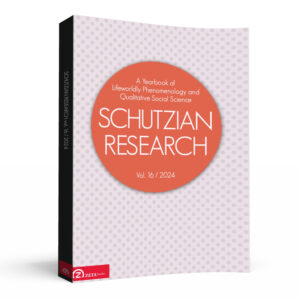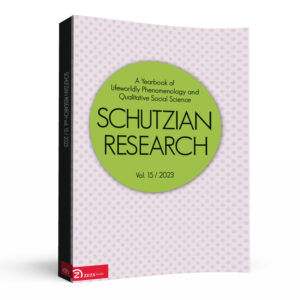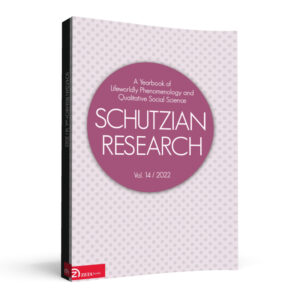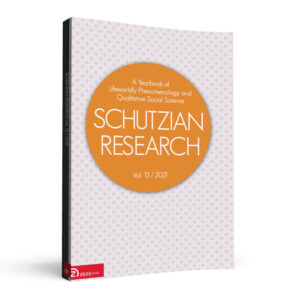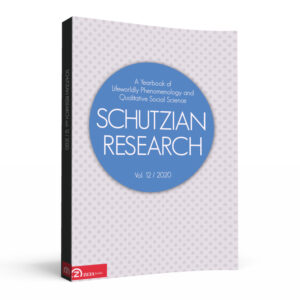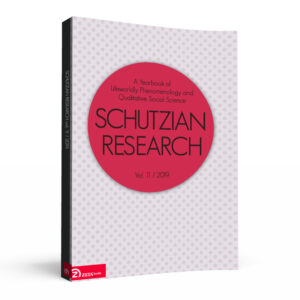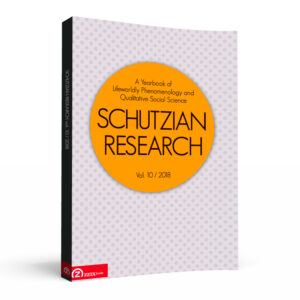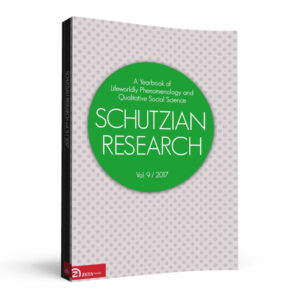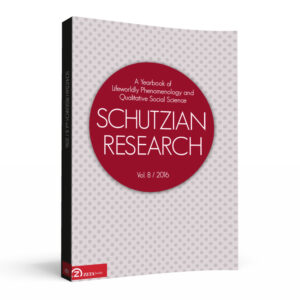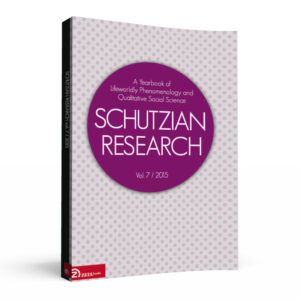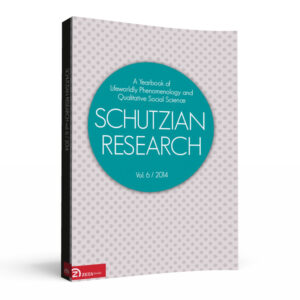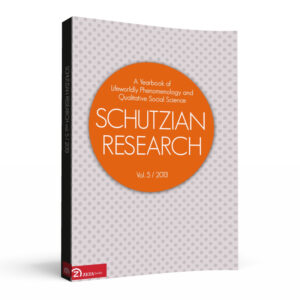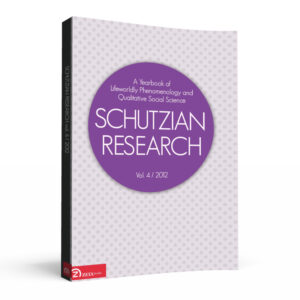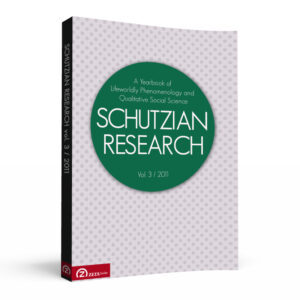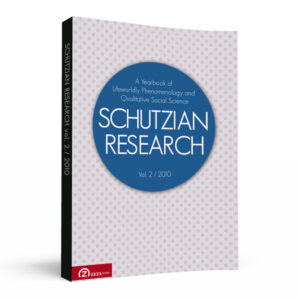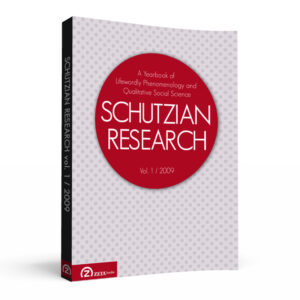Schutzian Research: A Yearbook of Lifeworldly Phenomenology and Qualitative Social Science
ISSN: 2067-0621 (paperback)
ISSN: 2248-1907 (electronic)
This subscription-based journal offers a hybrid open access option. If you are interested in this option, please Email Us.
For Institutional subscriptions (paperback or IP range, campus-wide online access), please Contact Us.
ONLINE ACCESS TO INDIVIDUAL ARTICLES: Philosophy Documentation Center
ARCHIVING: Long-term preservation of the Schutzian Research in electronic format will be assured through PORTICO and the CLOCKSS archive.
INDEXING / ABSTRACTING COVERAGE: Schutzian Research can be discovered through the following services: SCOPUS, Central & Eastern European Academic Source, CNKI Scholar, Dimensions, EBSCO Discover, Google Scholar, MIAR: Matriz de Información para el Análisis de Revistas, Microsoft Academic, PhilPapers, ProQuest Summon, Scilit, WorldCat Local.
AIMS & SCOPE: Schutzian Research is an annual journal that seeks to continue the tradition of Alfred Schutz. It seeks contributions that are philosophical, cultural-scientific, or multidisciplinary in character. We welcome a broad spectrum of qualitative and interpretive work, comparable with Schutz’s orientation but not necessarily derived from it. The journal is multilingual in character, with abstracts in English. All submissions will be blindly reviewed by at least two experts in the appropriate field.
SUBMISSIONS: sr@zetabooks.com. See GUIDELINES FOR AUTHORS
EDITORS-IN-CHIEF: Michael Barber (St. Louis University), Daniela Griselda López (CONICET, University of Buenos Aires).
ASSOCIATE EDITORS: CJochen Dreher (University of Konstanz); Michael Hanke (Federal University of Rio Grande do Norte); Masato Kimura (Tokyo University); Hisashi Nasu (Waseda University); Giulia Salzano (University of Perugia); Gerd Sebald (Friedrich Alexander University); Ilja Srubar (University of Erlangen-Nurnberg); Jerry Williams (Stephen F. Austin State University).
EDITORIAL BOARD: Gary Backhaus (Loyola College); Daniel Cefai (University of Paris); Ion Copoeru (University “Babes-Bolyai” of Cluj); Thomas Eberle (University of St. Gallen); Martin Endress (University of Trier); Jung, Hwa Yol (Moravian University); Suzanne Kassab (Yale University); Hubert Knoblauch (The Technical University of Berlin); Lenore Langsdorf (University of Southern Illinois); Elisabeth List (University of Graz); Joachim Renn (University of Erlangen-Nurnberg); Sato, Yoshikazu (Ritsumeikan University); Hans-Georg Soeffner (University of Konstanz); Florence Tocantins (Federal University of the State of Rio de Janeiro); Benno Werlen (University of Jena); Yu, Chung Chi (National Sun Yat-Sen University); Richard Zaner (Vanderbilt University).
HONORARY BOARD MEMBER: Claudia Schutz Gahagan (New York).
Publication Ethics Statement
Zeta Books follows COPE’s guidelines. The editorial team of “Schutzian Research” is committed to ensuring the integrity of the publication process. Conformance to standards of ethical behavior is therefore expected of all parties involved: Authors, Editors, Reviewers, and the Publisher.
Authors should present an objective discussion of the significance of research work as well as sufficient detail and references to permit others to confirm a chain of reasoning or experimental result. Fraudulent or knowingly inaccurate statements constitute unethical behavior and are unacceptable. Review articles should also be objective, comprehensive, and accurate accounts of the state of the art. The authors should ensure that their work is entirely original works, and if the work and/or words of others have been used, this has been appropriately acknowledged. Plagiarism in all its forms constitutes unethical publishing behavior and is unacceptable. Submitting the same manuscript to more than one journal concurrently constitutes unethical publishing behavior and is unacceptable. Authors should not submit articles describing essentially the same research to more than one journal. The corresponding author should ensure that there is a full consensus of all co-authors in approving the final version of the paper and its submission for publication.
Editors should evaluate manuscripts exclusively on the basis of their academic merit. An editor must not use unpublished information in the editor’s own research without the express written consent of the author. Editors should take reasonable responsive measures when ethical complaints have been presented concerning a submitted manuscript or published paper.
Reviewers must treat received manuscripts as confidential documents. Privileged information or ideas obtained through peer review must be kept confidential and not used for personal advantage. Reviews should be conducted objectively, and observations should be formulated clearly with supporting arguments, so that authors can use them for improving the paper. Any selected referee who feels unqualified to review the research reported in a manuscript or knows that its prompt review will be impossible should notify the editor and excuse himself from the review process. Reviewers should not consider manuscripts in which they have conflicts of interest resulting from competitive, collaborative, or other relationships or connections with any of the authors or institutions connected to the paper.
The Publisher will respond to alleged or proven cases of research misconduct, fraudulent publication, or plagiarism in close collaboration with the editors. The publisher will ensure that appropriate measures are taken to clarify the situation and to amend the article in question if necessary. This may include the publication of an erratum, clarification or, in the most severe case, the retraction of the affected work. The publisher, together with the editors, shall take reasonable steps to identify and prevent publication of papers where research misconduct has occurred, and under no circumstances encourage such misconduct or knowingly allow such misconduct to take place.
COPYRIGHT: After a period of 2 years elapses from the moment when the article is published, the accepted version (Word document) can be made publicly accessible. However, the final PDF version of the article cannot be put online.
REPUBLICATION: A future republication is possible only 2 years after the first publication in Schutzian Research.
AUTHOR FEES: There are no author fees for the regular publication (for Open Access, see below).
FORTHCOMING
Schutzian Research vol. 16 (2024). General Issue.

